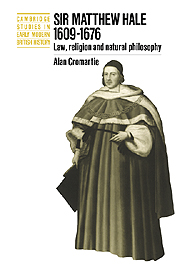10 - Hale's ‘latitudinarianism’
Published online by Cambridge University Press: 05 May 2010
Summary
One part of Hale's residual puritanism was strict observance of the sabbath day. Between the evening sermon and his supper, he meditated on the Christian faith, ‘and having a very ready hand at writing, he usually wrote his thoughts’. The bulk of the Hale papers now at Lambeth are products of this pious exercise. A few of them were read within his household, and published as a collection, the Contemplations moral and divine (1676), but most are quite unpublishable in their present form. The ten parts and five volumes of ‘De Deo’, which he worked on intermittently from 1662 to 1667, exemplify the method's obvious faults. This uncompleted monster of a work collapses into essays (many themselves unfinished) on an encyclopaedic range of topics. He was attempting a compendium of all the arguments for God's existence, beginning with ‘the voice of metaphysics’, then proceeding through physics and ethics to providence and conscience and the Bible. Its most important purpose, by the author's own account, was
(1) To keep my thoughts fixed.
(2) To keep them from being wholly lost.
(3) That I might in after time when perchance my understanding were better informed see my former mistakes.
These works exist to register opinion, and they certainly give the impression of a man who is thinking aloud. They have many of the qualities of an actual train of thought, being very repetitious, and painfully long-winded in making the simplest of points.
- Type
- Chapter
- Information
- Sir Matthew Hale, 1609–1676Law, Religion and Natural Philosophy, pp. 156 - 172Publisher: Cambridge University PressPrint publication year: 1995



